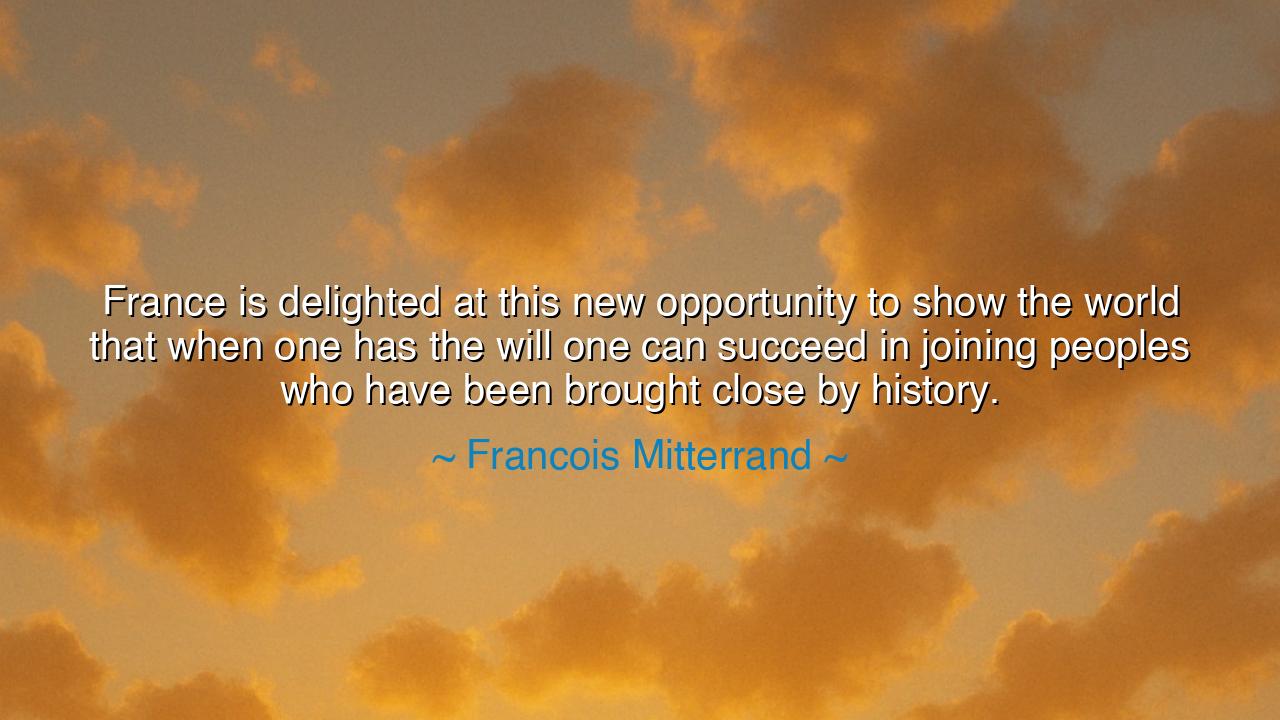
France is delighted at this new opportunity to show the world
France is delighted at this new opportunity to show the world that when one has the will one can succeed in joining peoples who have been brought close by history.






“France is delighted at this new opportunity to show the world that when one has the will one can succeed in joining peoples who have been brought close by history.” Thus spoke François Mitterrand, the President of France, whose words flowed not merely as a statement of diplomacy, but as a testament to the enduring dream of unity born from the trials of war. In this declaration, Mitterrand gave voice to the eternal truth that will is stronger than division, that history, though filled with suffering, can also be the foundation of reconciliation, and that nations once torn apart may, through courage and resolve, learn to stand side by side once more. His words echo like a hymn of renewal — the affirmation that humanity, when guided by the will to peace, can transform even its deepest wounds into bridges of fellowship.
The origin of this quote lies in the hopeful years following the devastation of the twentieth century, when Europe, shattered by two world wars, began the slow work of healing. Mitterrand spoke during the era of the European integration movement, a period when the nations of the continent sought not to conquer, but to cooperate. He understood that France and Germany — once bitter enemies — had been “brought close by history,” not only through bloodshed, but through shared destiny. To join these peoples was not to forget the past, but to redeem it. Mitterrand, alongside leaders like Helmut Kohl, believed that reconciliation was not an act of weakness, but of monumental strength — the strength to choose unity over vengeance, cooperation over pride.
These words were no idle sentiment; they were born from the heart of a generation that had seen Europe burn. Mitterrand himself had lived through the Second World War, had seen the fall of France, had endured captivity, and had witnessed his nation’s rebirth. He knew that the soil of Europe was heavy with memory — the memory of division, of occupation, of the countless dead who had fallen for causes now long dissolved. And yet, he also knew that out of the ruins could rise a greater civilization, one founded not on domination but on understanding. His “delight” was not triumphal; it was humble, reverent — the joy of one who has seen darkness and now beholds the dawn.
Consider, my children, the scene that became a living symbol of Mitterrand’s words: the year 1984, at Verdun, that sacred ground where the sons of France and Germany once slaughtered each other by the hundreds of thousands. There, before the memorial of the fallen, Mitterrand stood hand in hand with Chancellor Helmut Kohl. No speeches were needed; no pomp, no parade. In that single gesture, two men — once heirs to enmity — showed the world that history could bend toward healing. Their clasped hands spoke louder than armies: that when the will is united, what was once impossible becomes inevitable. That moment, more than any treaty, revealed the power of Mitterrand’s belief — that the will to join what history divided is itself an act of creation.
But Mitterrand’s message speaks not only to nations — it speaks to all humankind. Each person, in their own life, inherits a kind of history: conflicts, misunderstandings, wounds carried from the past. Like France and Germany, we are all brought close by history, yet separated by pride, fear, or pain. Mitterrand teaches that unity begins not with perfect harmony, but with the will to reconcile, the choice to reach across the chasm and build anew. For peace, whether between nations or within hearts, is never given freely; it must be forged through will and courage, through the humble work of forgiveness.
His words, though spoken in a moment of political optimism, carry the weight of timeless wisdom: that human destiny is collective. No nation, no person, stands apart. The rivers of our past all flow into the same ocean of future. When Mitterrand spoke of France’s joy in joining others, he reminded the world that greatness lies not in isolation, but in participation — in contributing one’s strength to the common good. The true glory of a nation, he implied, is not in conquest but in its ability to uplift others, to heal what history has broken.
So, my children, learn from the wisdom of Mitterrand’s words. When you face division — in your family, your community, your world — remember that will is the seed of reconciliation. Do not wait for wounds to close on their own; reach across them. Do not despair over the weight of the past; use it as the foundation upon which to build understanding. Whether among nations or between souls, the act of joining what was once divided is the noblest labor of all.
And thus, let Mitterrand’s truth endure: history may bind us through suffering, but the will to unite can transmute suffering into strength. When one has the will, one can indeed succeed — not in domination, but in communion; not in power, but in peace. For it is through such will that the world, long divided by its own making, may one day learn to live as one.






AAdministratorAdministrator
Welcome, honored guests. Please leave a comment, we will respond soon